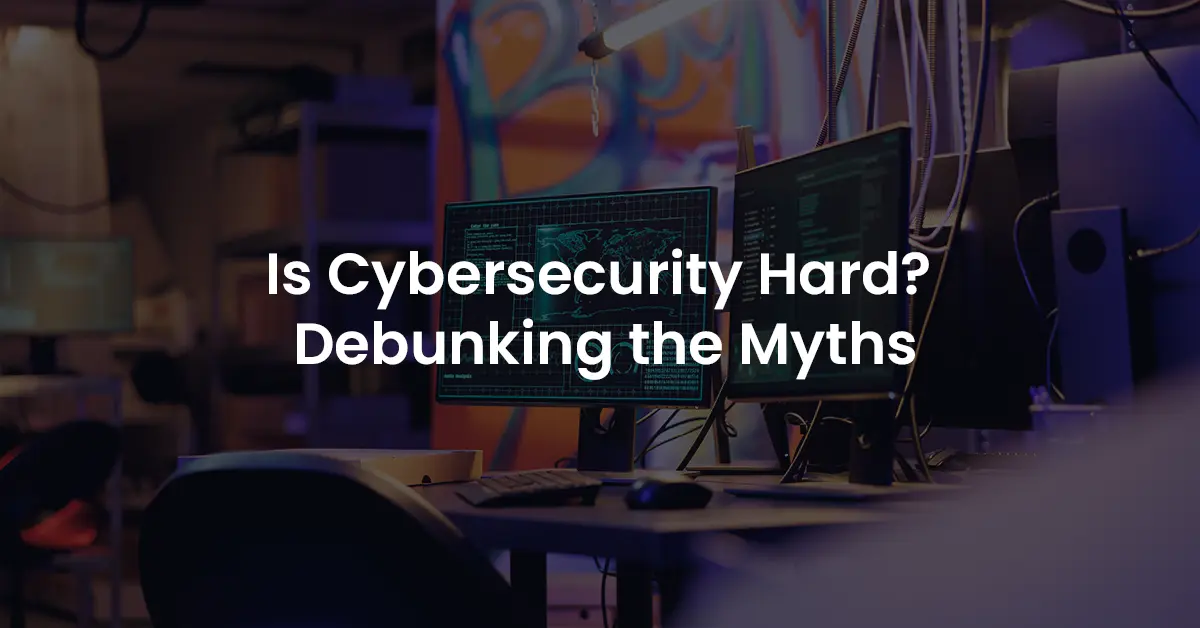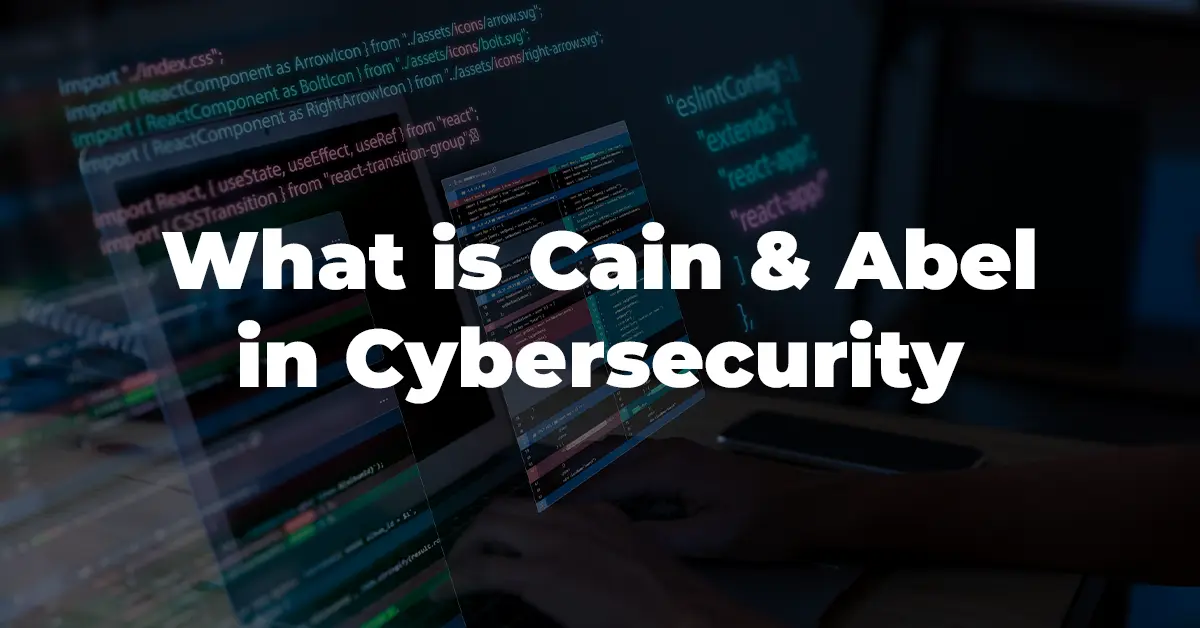“Is cybersecurity hard?” is one of the most searched questions among aspiring tech professionals and it’s not hard to see why. With growing concerns over data breaches, ransomware, and digital espionage, cybersecurity feels like a field reserved for technical wizards and code-breaking geniuses. But is that really the case?
As demand for cybersecurity professionals rises across every industry, it’s important to understand what the field actually involves, what makes it challenging, and whether it’s more accessible than it appears. In this article, we’ll explore the real complexity behind cybersecurity, separate myth from fact, and help you figure out if this career path is right for you.
What is Cybersecurity, Really?
Cybersecurity is often misunderstood as simply “hacking” or running antivirus software, but the truth is much broader and more strategic. At its core, cybersecurity is the practice of protecting digital systems networks, applications, hardware, and data from malicious actors who seek to exploit vulnerabilities for personal, financial, or political gain.
Understanding the CIA Triad
A foundational concept in cybersecurity is the CIA Triad, which stands for Confidentiality, Integrity, and Availability. These three principles shape nearly every decision and tool in the security world:
- Confidentiality ensures that sensitive information is accessed only by authorized individuals.
- Integrity ensures that data remains accurate, untampered, and trustworthy.
- Availability guarantees that systems and data remain accessible when needed, without downtime or interference.
Whether you’re configuring a firewall, encrypting customer data, or patching a server, you’re working to protect one or more parts of this triad. It’s a guiding framework that turns abstract security concerns into actionable goals.
The Scope of Cybersecurity
Cybersecurity is not a single job or skill. It’s a multidisciplinary field made up of domains such as:
- Network security – Protecting the infrastructure that connects systems and users
- Application security – Ensuring that software is developed and deployed securely
- Cloud security – Securing assets hosted on platforms like AWS, Azure, or Google Cloud
- Governance, risk, and compliance (GRC) – Aligning organizational policies with regulatory requirements
- Incident response and threat detection – Reacting to breaches and ongoing attacks
Each of these domains may require different tools, certifications, or mindsets. Some paths are deeply technical like reverse-engineering malware while others focus more on strategy, law, or organizational processes.
Common Misconceptions
Many people are intimidated by cybersecurity because of a few common myths. A popular one is that you must be a master programmer or mathematician to get started. While programming skills can certainly help, they are not mandatory for all cybersecurity roles. Many professionals enter the field from backgrounds in system administration, law enforcement, compliance, or even liberal arts. What matters most is your ability to think critically, adapt to new threats, and continuously learn.
Another widespread assumption is that cybersecurity is all about offensive hacking. While penetration testing is a fascinating and growing niche, most cybersecurity jobs are defensive focused on prevention, detection, and resilience. Many roles don’t involve code or direct system access at all, especially in GRC, auditing, and policy writing.
A Broad and Accessible Discipline
Cybersecurity’s reputation as a “hard” field often comes from misunderstanding its scope. Yes, it can be challenging, particularly because threats evolve rapidly and require constant learning. But it’s also a field with clear entry points, structured learning paths, and a wide range of roles for both technical and non-technical professionals. Whether you’re configuring firewalls, writing compliance documentation, or analyzing phishing logs, there’s likely a space in cybersecurity that matches your strengths.
Who’s Asking the Question? (Understanding the Perspective)
One of the most important things to recognize when asking “is cybersecurity hard?” is that the answer depends entirely on who’s asking. Different people bring different backgrounds, strengths, and assumptions to the table and the path into cybersecurity can look very different depending on where you’re starting from.
For Non-Tech Individuals
If you’re someone with little to no technical background, cybersecurity can feel intimidating at first. Acronyms like IDS, SIEM, and MFA are thrown around casually, and there’s a perception that you need to understand deep networking principles or write code just to keep up. But that’s not always true. While some cybersecurity roles are highly technical, others focus on governance, compliance, training, policy writing, and risk management. These paths often prioritize communication skills, problem-solving ability, and business understanding over pure tech skills.
For non-tech individuals, the biggest challenge is usually the learning curve. You’ll need to get familiar with how systems work, how data moves through networks, and what common vulnerabilities look like. However, with structured learning resources like free courses, certifications, and hands-on labs even beginners can start to build foundational knowledge within a few months.
For Aspiring IT Professionals
If you already work in IT, say, in help desk, networking, or system administration, you’re in a great position to pivot into cybersecurity. Many of the concepts you already use daily, like Active Directory, ports and protocols, endpoint management, or troubleshooting, are directly relevant to cybersecurity work.
For IT professionals, cybersecurity isn’t necessarily “harder” than what they already do, it’s just a different application of similar skills. Instead of fixing systems, you’re protecting them. Instead of simply deploying software, you’re evaluating its vulnerabilities. The real challenge at this stage is transitioning your mindset from general support to security-focused thinking. That includes risk assessment, threat modeling, and a deeper understanding of adversarial behavior.
For Mid-Career Switchers
Mid-career professionals from fields like law, auditing, military service, or business analysis often ask whether cybersecurity is worth the leap and whether they’re too late to start. The good news? You’re not too late. In fact, your previous experience might be exactly what employers need.
Compliance-heavy sectors like finance or healthcare value professionals who understand regulations, documentation, and process. Roles in GRC (Governance, Risk, and Compliance) or security auditing don’t require deep coding knowledge but do require strong analytical thinking, attention to detail, and excellent communication.
The main challenge here isn’t technical aptitude, it’s navigating a new industry’s language and culture. Fortunately, many of the core cybersecurity skills like critical thinking, pattern recognition, and the ability to assess risk are universal and transferable.
What Makes Cybersecurity Difficult?
Despite its accessibility, cybersecurity does come with legitimate challenges especially if you’re expecting a walk in the park. The complexity of systems, the speed at which threats evolve, and the high stakes of real-world security make this a serious and demanding profession. So, why is cybersecurity hard for some people? Let’s unpack the core reasons.
Technical Complexity
One of the biggest hurdles is the sheer technical scope of the field. Cybersecurity professionals often need a working knowledge of networks, operating systems, cloud platforms, databases, and scripting languages. Understanding how TCP/IP works, what DNS hijacking looks like, or how Linux permissions affect vulnerability exposure is essential in many roles.
It’s not just about knowing how systems function, it’s about understanding how they can be broken, exploited, or manipulated. That takes time, hands-on practice, and a lot of curiosity. What’s more, the threat landscape doesn’t stand still. Attack techniques evolve quickly, which means continuous learning is not optional, it’s baked into the job.
Certifications and Educational Requirements
Unlike some other careers, cybersecurity has a well-established (and somewhat intimidating) certification landscape. Terms like CompTIA Security+, CEH (Certified Ethical Hacker), CISSP (Certified Information Systems Security Professional), and OSCP are tossed around like currency in job postings.
These certifications serve as gatekeepers for employers, and many entry-level jobs expect at least one. That means time, money, and effort are often required just to break in. For those wondering “is cybersecurity harder than programming?”, it really depends. Programming involves building systems; cybersecurity is about breaking, defending, or analyzing them. Each field requires problem-solving, but cybersecurity often has broader scope and deeper cross-domain knowledge requirements.
Real-World Pressure and Responsibility
Cybersecurity isn’t just technical, it’s also deeply consequential. A misconfigured firewall or missed phishing attempt can cost a company millions or expose personal data from thousands of users. In some roles, like incident response or threat hunting, you’re working under pressure, often during active breaches or system downtime. The stakes are high, and the margin for error is small.
This real-world impact can make cybersecurity rewarding—but also intense. Not everyone thrives in that kind of environment, and that’s perfectly okay. It’s important to choose a cybersecurity path that fits your temperament and stress tolerance, whether that’s on the front lines or in a more strategic, policy-driven role.
Tool Overload and Ecosystem Complexity
Finally, cybersecurity is often difficult because of the overwhelming number of tools and platforms. A single security stack might include endpoint protection, a firewall, an intrusion detection system (IDS), a SIEM (Security Information and Event Management) platform, a vulnerability scanner, an identity provider, and several cloud security consoles. Learning to use and more importantly, to correlate data across these tools takes time and discipline.
Many professionals spend years mastering just one or two of these systems. For newcomers, the sea of dashboards, logs, alerts, and acronyms can feel like trying to drink from a firehose. Fortunately, many entry-level roles are focused, and training resources are more accessible than ever.
What Makes Cybersecurity Easier Than You Think
Cybersecurity gets a lot of attention for being complex, but it’s also more accessible than most people realize especially today. With multiple entry points, beginner-friendly tools, and growing community support, it’s become a welcoming field for people from all backgrounds.
Multiple Career Paths, Not One Narrow Lane
Unlike fields where a single degree or skillset defines your trajectory, cybersecurity offers many roles that cater to different personalities and technical comfort levels. Whether you’re interested in analyst work, compliance and risk, policy and governance, or offensive testing, there’s a path that matches your strengths. Many people start in non-technical positions and gradually grow into more technical roles.
Free Resources Make Learning Accessible
One of the biggest advantages for newcomers is the wealth of free and low-cost platforms that let you learn by doing. Platforms like TryHackMe and Hack The Box offer guided, gamified labs where you can simulate attacks and defenses in a safe, legal environment. You don’t need a lab of your own these platforms do the heavy lifting so you can focus on learning.
Transferable Skills from Other Tech Roles
If you’ve worked in IT support, QA, or even project management, chances are you’ve already built some of the skills required in cybersecurity. Understanding how systems behave, troubleshooting network issues, or documenting issues all build a foundation for roles in monitoring, auditing, or risk management.
Clear and Structured Career Paths
Unlike in the past, today’s cybersecurity ecosystem includes clear certification paths and roadmaps. You can start with beginner credentials like CompTIA Security+ or Google’s Cybersecurity Certificate, and move toward specialized certs like CISSP, CISM, or OSCP depending on your interests. With guidance available online and communities ready to help, you don’t have to figure it out alone.
Is Cybersecurity Right for You? (Self-Assessment Checklist)
Before jumping into the field, it’s worth asking yourself some honest questions. Cybersecurity is rewarding, but it’s not for everyone and that’s okay.
Are You a Problem Solver?
Cybersecurity is full of complex issues that require logical thinking. Whether you’re digging through logs, tracking an attack, or writing a policy, you’ll often need to solve puzzles with no clear answers. If you enjoy untangling problems, you’ll likely find satisfaction in this field.
Are You Comfortable with Tech Learning?
You don’t need to be a programmer, but you should be ready to learn how computers, networks, and systems work. Cybersecurity is deeply tied to how digital systems function and how they can fail.
Are You Detail-Oriented and Curious?
Many attacks come down to small, overlooked vulnerabilities. Whether you’re checking firewall rules or auditing user access, attention to detail is critical. The best cybersecurity professionals are naturally curious they want to know how things work, and how they can break.
Are You Committed to Ongoing Learning?
The cybersecurity world moves fast. Threats evolve, tools change, and new regulations emerge. If you’re willing to keep learning throughout your career, you’ll thrive here. If you’re looking for a field where you can “learn it once and do it forever,” cybersecurity may not be the best fit.
How to Get Started Without Getting Overwhelmed
Cybersecurity may feel massive at first, but it becomes manageable when you start with a plan and break the process into clear steps.
Start with IT Fundamentals
Begin with understanding how computers and networks actually work. Certifications like CompTIA A+ and Network+ teach the basics of hardware, operating systems, networking protocols, and troubleshooting. These concepts are the backbone of cybersecurity and make everything else easier to grasp.
Learn Basic Scripting
You don’t need to be a full-stack developer, but learning some Python or Bash scripting helps automate tasks, manipulate files, and analyze data. These skills are common in both blue team (defensive) and red team (offensive) roles and are increasingly expected even at junior levels.
Practice in Safe Labs
Platforms like TryHackMe, Hack The Box, and OWASP Juice Shop offer simulated environments where you can learn real skills hands-on like scanning for vulnerabilities, exploiting misconfigurations, and mitigating risks. These environments are interactive, scenario-based, and suitable for complete beginners.
Join the Cybersecurity Community
Don’t go it alone. Join communities like r/cybersecurity and r/netsec on Reddit, InfoSec Discord servers, or LinkedIn groups. These spaces are full of professionals, beginners, and hiring managers. They’ll keep you informed, motivated, and connected to real opportunities as you learn.
Conclusion
So, is cybersecurity hard? Yes but not in the way most people think. It demands commitment, curiosity, and continuous learning, but it’s not a field reserved for elite hackers or programming prodigies. In fact, the diversity of roles, the abundance of learning resources, and the industry’s growing need for skilled professionals make cybersecurity one of the most approachable and rewarding careers in tech today.
Whether you’re coming from IT, switching careers, or just starting out, there’s a path in cybersecurity that fits your skill set and learning style. What matters most is your willingness to learn, adapt, and stay engaged in a constantly evolving digital landscape.
If you’re asking yourself, “Is cybersecurity right for me?”, you’re already on the right path — because the best cybersecurity professionals are the ones who ask good questions and never stop looking for answers.







